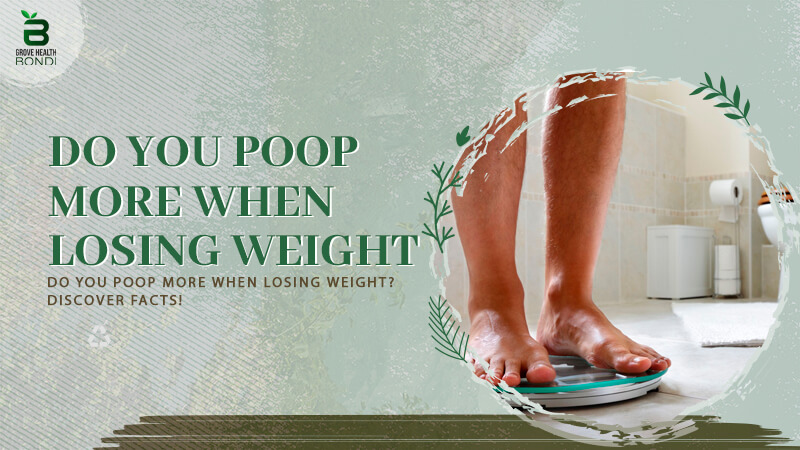Have you ever pondered the question, “Do you poop more when losing weight?” Or wondered about the relationship between weight loss and bowel movements? You may have noticed that as you strive to lose weight, your bathroom visits also increase. This has sparked curiosity in many, questioning whether weight loss has any impact on the digestive system and specifically, are you excreting excess fat through your bowel movements? In this article, join us at Grove Health Bondi as we uncover the intriguing and unexpected truths about the connection between weight loss and the frequency of bowel movements, while answering the above question.

1. How Much Does Poop Weigh?
The weight of an individual’s stool varies and depends on several factors such as body size, dietary habits, water intake, and bowel movement frequency. On average, stool weighs between 1/4 to 1 pound.
People with larger bodies or those who consume more food, or those who have less frequent bowel movements, typically have heavier stools. Generally, it takes about 33 hours for food to be transformed into stool and exit the body.
We often feel lighter after a bowel movement, even though the weight loss is minimal. This is because defecation helps reduce gas and bloating, making the body feel more comfortable.
Stool is primarily composed of water, but it also includes other components such as bacteria (both living and dead), protein, undigested food (fiber), waste, salts, and fats. The longer the stool stays in the intestines, the drier and heavier it becomes. While most people usually have a bowel movement every day, having one to three bowel movements per day or at least once every three days is also considered normal.

2. Do You Burn Calories When You Poop?
Yes, you indeed burn calories when you have a bowel movement. Our bodies continuously burn calories to maintain basic daily activities, including breathing, digesting food, maintaining body temperature, and performing low-movement activities like reading. When having a bowel movement, the body continues to burn calories.
According to experts, we burn an average of 40-55 calories per hour while sleeping and slightly more when watching TV or sitting upright. However, the specific amount of calories you burn depends on your body size. For instance, a person weighing 170 pounds may burn approximately 139 calories in an hour of sitting.
If you feel strained when having a bowel movement, you might burn a small additional amount of calories. However, you should avoid straining too hard during bowel movements as this can lead to hemorrhoids and is a sign of constipation.
Some sources suggest that on average, a person might burn between 5 to 20 calories per bowel movement. Another source indicates that people burn about 68 calories per bowel movement.

3. Do You Poop More When Losing Weight: 4 Ways Your Stool Can Change!
When you’re losing weight, you might notice some changes in your bowel movements. Here are four ways your poop might change:
3.1 Frequent Bowel Movements
If you notice an increase in your bowel movements, it could be a positive sign that changes in your diet are aiding your weight loss. Have you been consuming more fruits and vegetables? This could help you achieve more regular bowel movements.
Dr. Niket Sonpal, a leading internist and gastroenterologist in New York, has emphasized that a predominantly plant-based diet can benefit your digestive system. Dr. Sonpal stated, “When you consume a lot of plant-based foods, the amount of soluble fiber in your stool increases. This boost in fiber can make your stool softer, smoother, and therefore easier to pass.” He further explained, “Fiber causes your colon to expand, which can lead to more frequent bowel movements.”
Additionally, if you have also been increasing your exercise regimen, this could contribute to an increase in your bowel movements.

3.2 Dealing With Constipation
Constipation can be an unwelcome consequence when you significantly alter your diet. If you’re experiencing this issue, increasing fiber in your diet, ensuring adequate hydration, and maintaining a regular exercise schedule can help improve the situation. Over-the-counter treatments can help alleviate discomfort, but you should discuss with a healthcare professional before using any medication. In cases of persistent or severe constipation, you should seek advice from a healthcare expert.

3.3 Risk of Diarrhea
Persistent or frequent diarrhea can increase the risk of dehydration and may lead to unwanted weight loss, often referred to as water weight loss. While you might see the numbers on the scale decrease after a day of diarrhea, this does not accurately reflect your true weight and body composition. Prolonged diarrhea can negatively impact your digestive system, reducing nutrient absorption and leading to changes in weight.

3.4 Your Stool Color May Change
Have you noticed a change in the color of your stool? According to the Cleveland Clinic, the food you eat can directly influence the color of your stool. Therefore, a colorful diet can produce similar results in the bathroom.
For instance, eating a lot of green vegetables can turn your stool green, while consuming beets or cherries can make your stool red. Blueberries can darken your stool to a deep blue (or even black), and carrots can shift your stool to an orange hue.
However, if you notice a consistent change in your stool color that cannot be linked to the food you eat, you should pay attention. According to the Cleveland Clinic, red or black stool could be a sign of blood in the stool, and gray could indicate a problem with your pancreas or bile duct.

4. Best Ways to Lose Weight
The most effective method for weight loss is to limit your calorie intake compared to the amount of calories your body burns daily. While maintaining good bowel habits is important for overall health, adjusting your diet and increasing physical activity are the real determinants for weight loss.
If you’re looking to lose weight, consider reducing the number of calories you consume each day. As a general rule, to lose 1 pound, you need to create a deficit of about 3,500 calories.

By starting with a reduction of about 500 calories per day, you can achieve steady weight loss, about 1 pound per week. This can be achieved through diet adjustments and increased physical activity. For example, if you exercise for 30 minutes each day and burn 250 calories, you would need to cut an additional 250 calories from your daily diet to lose 1 pound per week.
To maintain optimal health during weight loss, it’s important to limit processed foods, ensure adequate fiber intake, and eat plenty of natural, nutrient-rich foods. A recent study showed that individuals who consume a lot of fiber, about 25 grams per day, are more likely to sustain weight loss.
A fiber-rich diet also helps stimulate regular bowel movements, reducing feelings of bloating. Some fiber-rich foods include:
- Beans
- Lentils
- Broccoli
- Berries
- Pears
- Apples
- Green peas
- Whole wheat spaghetti
5. FAQs
5.1 Why Am I Pooping More and Losing Weight?
There are several reasons that could lead to the frequent bowel movements and weight loss you are experiencing. One common cause is changes in your diet. For instance, increasing your fiber intake from whole grains can lead to more frequent bowel movements. However, digestive disorders such as Salmonella infection, Giardia parasite infection, celiac disease, Crohn’s disease, irritable bowel syndrome, antibiotic-associated diarrhea, and ulcerative colitis can also cause this condition.
In addition, other health conditions such as unwanted weight loss could be due to mental health issues like depression, anxiety, eating disorders, and obsessive-compulsive disorder (OCD). Digestive issues like celiac disease or irritable bowel syndrome (IBS), or other health conditions like hyperactive thyroid, type 2 diabetes, or heart failure could also be the cause.
5.2 Does Weight Loss Increase Bowel Movements?
Yes, weight loss can increase bowel movements, especially if your diet is high in fiber. However, this does not significantly contribute to long-term weight loss. The key to healthy weight loss is a balanced diet and regular exercise. If you are experiencing more frequent bowel movements along with other symptoms, you should consult a healthcare professional.
5.3 Do You Get Fatter When Losing Weight?
If you notice your stool is a bright yellow color or has a greasy appearance, it could be a sign that your body is digesting too much fat. This could stem from difficulties in nutrient absorption or issues related to the production of enzymes and bile necessary for digestion.
5.4 Where Does Your Weight Go When You Lose Weight?
When you lose weight, you might wonder where the lost weight goes. The fascinating fact is that most of the fat you lose transforms into carbon dioxide and water. This carbon dioxide is then exhaled, while the water is absorbed into your bloodstream and eventually eliminated through urine or sweat. To illustrate, if you lose 10 pounds of fat, in reality, you’ve exhaled 8.4 pounds of fat as carbon dioxide, and the remaining 1.6 pounds have turned into water. This is a remarkable chemical process of your body in weight loss.
5.5 Why Am I Pooping Water?
Frequent loose stools, also known as diarrhea, can stem from various causes. Sometimes, it’s just a temporary consequence of consuming contaminated food or contracting a certain virus. However, if this condition persists, it could be a sign of a more serious underlying health issue. Diarrhea is defined as the condition of passing loose instead of solid stool multiple times in a day.
5.6 What Does Unhealthy Stool Look Like?
Unhealthy stool often has distinct signs. If your stool is red, nutty brown, or black like ink, these are signs that need attention. Such changes in color and texture require immediate medical evaluation.
5.7 Does Pooping Mean You’re Losing Weight?
While you may feel lighter after a bowel movement, this does not mean you have actually lost weight. Bowel movements are not a method of weigt loss. In fact, true weight loss comes from burning more calories than you consume, not from what you eliminate through bowel movements. Therefore, it’s important not to confuse the feeling of lightness after a bowel movement with actual weight loss.
5.8 Can Poop Help You Lose Weight?
No, fat loss does not primarily come from bowel movements. When you lose fat, the fat in your body is mainly metabolized and broken down through the process of converting fat into carbon dioxide and water. This carbon dioxide is then exhaled from your body through respiration, while the water is eliminated through urine, sweat, and other bodily fluids. Only a small amount of the fat you lose is actually excreted through stool, while the majority is eliminated through other processes as mentioned above.
5.9 Does Diarrhea Make You Lose Weight?
True weight loss is associated with reducing excess fat in the body, and this process is not directly related to bowel movements. However, if you have diarrhea, it could lead to weight loss, but this is primarily due to the loss of water and other important nutrients due to illness, not the reduction of excess fat.
5.10 How Much Weight Do You Lose When You Have Diarrhea?
The amount of weight you lose when experiencing diarrhea depends on the duration and severity of the condition. However, it’s important to remember that most of the weight lost during this time is primarily due to dehydration. As you recover and your bowel movements and eating habits return to normal, you will typically regain most of the lost weight. Therefore, diarrhea is not a healthy or effective method of weight loss.
6. Conclusion
The relationship between weight loss and our daily bowel habits is indeed more complex than we often think. When you ask, “Do you poop more when losing weight?”, remember that every factor from your diet to the amount of water you drink each day can influence the answer.
To gain a better understanding of body and health-related issues, continue to follow articles from Grove Health. We are committed to supporting you throughout your health journey, providing you with valuable information and practical advice.

